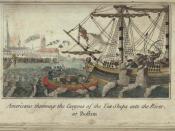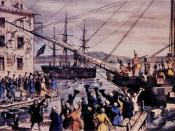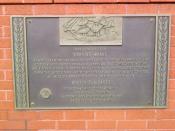In the 1770s, the French and Indian War had just ended and Britain was in massive debt. Britain, being the mother country, placed numerous taxes and acts into place on its child, the colonies, to pay the debt as per mercantilism. The colonists were furious because they believed they had nothing to do with the war and were just dragged in; hence they should not have to help pay the debt. The British military measures and the restriction of civil liberties were really important factors in prompting the Americans to rebel in 1776, although the Parliamentary taxation prompted them to rebel the most.
First, Parliamentary taxation prompted the Americans to rebel the most. The Sugar Act, the Stamp Act, and the Townshend Duties were the primary taxes and duties that ultimately led the colonists to rebel. The Sugar Act of 1764 was a tax designed to eliminate French and Spanish trade by raising duties on molasses.
The act was designed with the intent of raising money to pay one-fifth of the military expenses in North America brought on by the French and Indian War. The Sugar Act raised the tax on molasses and sugar from the amount they initially taxed in the Molasses Act of 1733. The tax came to be because Britain not only wanted to make up for the money she had been losing to the Triangular Trade, but also in order to make money for the crown. The significance of the Sugar Act is that it infuriated colonists over the increased tax on imported sweeteners. The Stamp Act of 1765 was a tax on all printed works. It forced Americans to have a stamp affixed to newspapers, all legal documents, and even Bibles. This act angered many colonists because it was an internal tax, meaning it affected...


